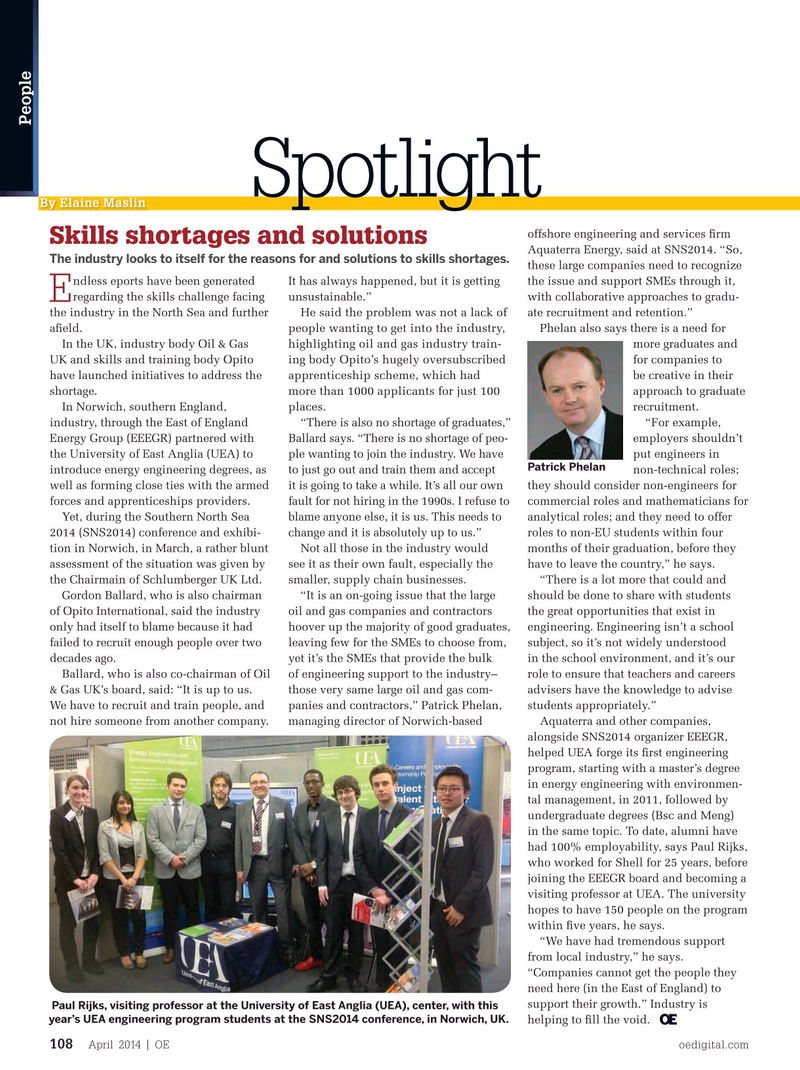
Page 106: of Offshore Engineer Magazine (Apr/May 2014)
Read this page in Pdf, Flash or Html5 edition of Apr/May 2014 Offshore Engineer Magazine
People
Spotlight
By Elaine Maslin offshore engineering and services ? rm
Skills shortages and solutions
Aquaterra Energy, said at SNS2014. “So,
The industry looks to itself for the reasons for and solutions to skills shortages. these large companies need to recognize
It has always happened, but it is getting ndless eports have been generated the issue and support SMEs through it, unsustainable.” regarding the skills challenge facing with collaborative approaches to gradu-
E
He said the problem was not a lack of the industry in the North Sea and further ate recruitment and retention.” people wanting to get into the industry, a? eld. Phelan also says there is a need for highlighting oil and gas industry train-
In the UK, industry body Oil & Gas more graduates and ing body Opito’s hugely oversubscribed
UK and skills and training body Opito for companies to apprenticeship scheme, which had have launched initiatives to address the be creative in their more than 1000 applicants for just 100 shortage. approach to graduate places.
In Norwich, southern England, recruitment. “There is also no shortage of graduates,” industry, through the East of England “For example,
Ballard says. “There is no shortage of peo- Energy Group (EEEGR) partnered with employers shouldn’t ple wanting to join the industry. We have the University of East Anglia (UEA) to put engineers in
Patrick Phelan to just go out and train them and accept introduce energy engineering degrees, as non-technical roles; it is going to take a while. It’s all our own well as forming close ties with the armed they should consider non-engineers for fault for not hiring in the 1990s. I refuse to forces and apprenticeships providers. commercial roles and mathematicians for blame anyone else, it is us. This needs to Yet, during the Southern North Sea analytical roles; and they need to offer change and it is absolutely up to us.” 2014 (SNS2014) conference and exhibi- roles to non-EU students within four
Not all those in the industry would tion in Norwich, in March, a rather blunt months of their graduation, before they see it as their own fault, especially the assessment of the situation was given by have to leave the country,” he says. smaller, supply chain businesses. the Chairmain of Schlumberger UK Ltd. “There is a lot more that could and “It is an on-going issue that the large Gordon Ballard, who is also chairman should be done to share with students oil and gas companies and contractors of Opito International, said the industry the great opportunities that exist in hoover up the majority of good graduates, only had itself to blame because it had engineering. Engineering isn’t a school leaving few for the SMEs to choose from, failed to recruit enough people over two subject, so it’s not widely understood yet it’s the SMEs that provide the bulk decades ago. in the school environment, and it’s our of engineering support to the industry– Ballard, who is also co-chairman of Oil role to ensure that teachers and careers those very same large oil and gas com- & Gas UK’s board, said: “It is up to us. advisers have the knowledge to advise panies and contractors,” Patrick Phelan, We have to recruit and train people, and students appropriately.” managing director of Norwich-based not hire someone from another company. Aquaterra and other companies, alongside SNS2014 organizer EEEGR, helped UEA forge its ? rst engineering program, starting with a master’s degree in energy engineering with environmen- tal management, in 2011, followed by undergraduate degrees (Bsc and Meng) in the same topic. To date, alumni have had 100% employability, says Paul Rijks, who worked for Shell for 25 years, before joining the EEEGR board and becoming a visiting professor at UEA. The university hopes to have 150 people on the program within ? ve years, he says. “We have had tremendous support from local industry,” he says. “Companies cannot get the people they need here (in the East of England) to support their growth.” Industry is Paul Rijks, visiting professor at the University of East Anglia (UEA), center, with this year’s UEA engineering program students at the SNS2014 conference, in Norwich, UK. helping to ? ll the void.
April 2014 | OE oedigital.com 108 000_OE0414_Spotlight2.indd 108 3/22/14 4:34 PM

 105
105

 107
107